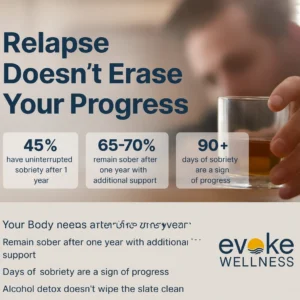You didn’t forget everything.
You didn’t lose it all.
And no matter what your brain is screaming right now—you’re not back at square one.
You’re here. You’re reading this. That’s not nothing.
If you’re in relapse after 90+ days of sobriety, we want to say this clearly: you haven’t failed. You’ve survived.
And now, you might need help to find your footing again.
That’s what alcohol detox is for—not punishment, not penance. It’s a place to reset your system so you can reclaim your recovery, not start from scratch.
At Evoke Wellness Ohio, we specialize in helping alumni reconnect with the tools they already have. You don’t need to be taught all over again. You just need a safe, judgment-free place to come back to yourself.
Here’s what our alcohol detox program in Hilliard, Ohio, can offer.
Relapse Doesn’t Erase Your Progress
It’s common for people who relapse to feel like all their previous work—every sober day, every meeting, every tool they used—was for nothing.
That’s just not true.
You may feel overwhelmed or ashamed. But the neural pathways you built during recovery don’t disappear. Your insight, your strength, your hard-won growth—it’s all still in there.
Alcohol detox doesn’t wipe the slate clean. It helps you access what’s already there.
Your Body Needs Help Too
Relapse isn’t just a mental or emotional event—it’s physical.
After a return to drinking, especially after a period of sobriety, your body reacts fast. Withdrawal symptoms can be worse. Your tolerance may have changed. Cravings can hit harder and quicker.
That’s where alcohol detox comes in. It’s not just about “quitting.” It’s about stabilizing.
In detox, you’re medically supported through the physical discomfort and danger of withdrawal—so that your mind and spirit can get clear enough to re-engage with recovery.
Think of it as clearing the static so you can hear your own voice again.
You Don’t Have to Be a “Newcomer” Again
Relapse can play tricks on your identity. It can make you question whether you were ever really sober at all. It can whisper lies like, “You never really got it,” or “You’re just pretending now.”
Don’t believe that voice.
Here’s what we tell alumni returning for care:
You already know how to do this. You just need help doing it now.
You don’t need to be re-taught everything. You need space to remember what works—and compassion while you brush the dust off.
One Client Told Us:
“I had 9 months. I was doing okay, and then I wasn’t. I thought I had to start over. But what I found was… I didn’t forget. The tools were still there. I just had to pick them up again.”
– Detox Client, 2024
This is why alcohol detox exists. Not just for emergencies. But for moments when it feels impossible to stop without help—and scary to ask for it.

What Alcohol Detox Can Do After Relapse
For returning alumni, alcohol detox offers more than symptom management. It provides:
- Stabilization after reintroducing alcohol
- Medical support through unpredictable withdrawal symptoms
- Emotional safety during a high-shame period
- Space to re-engage with care—gently, on your own terms
And maybe most importantly: it helps you interrupt the shame spiral before it deepens.
Because if you’ve relapsed, you know how fast that spiral moves. Detox stops it from swallowing you whole.
Relapse Isn’t a Moral Failure. It’s a Sign You Need Support.
You’re not weak for coming back.
You’re not broken for needing more.
You’re human. And recovery was never meant to be a solo act.
At Evoke Wellness Ohio, we see alumni return after 90 days, after 9 months, even after multiple years. And every single one of them felt ashamed—until they walked through the door and remembered: they still mattered. Their story wasn’t over. And neither is yours.
You’re Not the Only One
There’s an idea that if you relapse, you should keep it to yourself. Fix it quickly. Quietly. On your own.
That isolation is where things get worse.
Relapse is part of many people’s recovery stories. It doesn’t mean you’re weak—it means you’re learning something new about what you need.
Detox gives you a place to process that learning safely.
It helps you move from “I messed up” to “I made a new decision.”
And that decision? It counts.
See how our alcohol detox center in Hilliard helps people return to recovery with respect.
Alcohol Detox FAQ for Relapsed Alumni
Is detox different the second time?
It can be. If your body has adjusted to sobriety, reintroducing alcohol may lead to stronger withdrawal symptoms. That’s why medical supervision matters even more this time.
Will people at the center judge me for relapsing?
Absolutely not. Our team is trained to meet you with compassion, not shame. Many staff members are in recovery themselves—they get it.
Do I need to commit to long-term treatment again?
Not necessarily. Detox can be a standalone step. Our team will work with you to explore options based on what you want and need.
What if I’m not drinking every day? Do I still need detox?
Possibly. If you’re experiencing physical or emotional distress when stopping, or if you’re afraid to stop alone, detox can be a safe option—even if your drinking feels “moderate.”
Can I return to a program I’ve already completed?
In many cases, yes. Alumni often return to IOP, outpatient, or aftercare services. We’ll help you find the best fit and reconnect with the support that once worked for you.
This Is Still Your Story
Relapse isn’t the end of your story. It’s a page turn.
Alcohol detox doesn’t pull you backward—it helps you reclaim the pen.
You’re not too far gone. You’re not too late. You’re not starting over.
You’re starting again—with help, this time. And we’ll be here, not with judgment, but with steady hands, warm rooms, and real support.
You’re not starting over. You’re starting again—with help.
Call (866)430-9267 or visit Evoke Wellness Ohio’s Alcohol Detox Center to find out how we support alumni returning to care—without shame or pressure.



